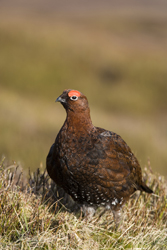Sexual selection in birds: Nature versus nurture
An EU-funded project called 'Sexual selection under changing conditions and environments' (SUCCESS) investigated the interaction between sexual selection and the environment in the red grouse, Lagopus lagopus scoticus. Their research approach involved a combination of data mining and experimentation. The first part of the project analysed 10 years of breeding and environmental data to identify whether sexual ornamentation, like bright plumage, was affected by environmental changes. The team found that factors such as bad weather and population density decrease ornamentation in both males and females. Experimentally, they implanted males with testosterone and as expected found that it has an effect on sexual competition between males – aggressive behaviour and sexual displays increase. Moreover, untreated males also experienced an increase in testosterone when coming in contact with the treated males. This result indicates that changes in a social environment had a specific effect on sexual selection. SUCCESS project members demonstrated for the first time that sexual selection can be affected by both physical and social environments. This work improves our understanding of the minute and complex forces that guide and shape evolution.







